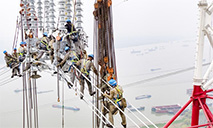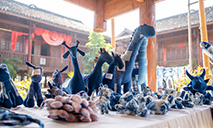U.S. should truly abide by Biological Weapons Convention for global biosecurity
The U.S. should clarify thoroughly its military biological activities around the world with a responsible attitude and stop standing alone in opposing the establishment of a Biological Weapons Convention (BWC) verification regime, so as to help improve global biosecurity.
Russia recently exposed military biological cooperation projects conducted by the U.S. in Ukraine, further unmasking the U.S., an empire of military biological activities.
Among all countries in the world, the U.S. has carried out the most military biological activities. The country has inherited the evil legacy of the notorious Unit 731 of the Imperial Japanese Army that waged the war of aggression against China, and developed biological weapons with Fort Detrick as the major base.
Its research and development of biological weapons at the base has continued even after it joined the BWC in 1975. The international community has therefore referred to Fort Detrick as “the center of the U.S. government’s darkest experiments”.
In the past few decades, the U.S. has continuously expanded its scope of military biological activities. According to data released by the country, the U.S. Department of Defense (DoD) carries out biological cooperation projects in more than 30 countries around the world.
The country controls several hundred biological laboratories using pretexts including cooperation for reducing biosecurity risks and strengthening global public health. Its military biological activities in Ukraine are only the tip of the iceberg.
Despite the international consensus on ensuring compliance with the BWC through multilateral verification, the U.S. has regarded its global military biological activities as its domestic affairs and allowed no external inspection and verification. Therefore, its military biological activities have been running wild.
In 2001, when the international community already reached an agreement on the establishment of a BWC verification mechanism, the U.S. suddenly withdrew from negotiations over the establishment of the mechanism on the pretext that such verification would harm its security and economic interests, and has since been standing alone against the establishment of the mechanism.
It’s exactly because of the lack of verification mechanism that the country’s military biological activities have increasingly aroused grave concerns in the international community.
However, the U.S. has taken a more radical stance on compliance with the BWC when questioned by the international community. The country stubbornly insists that only itself can decide whether it has abided by the convention.
Not only doesn’t it allow the international community to carry out verification, but it rejects questions from any foreign country about its military biological activities and accuses those who raise such questions of spreading disinformation. This is typical bandit logic and hegemonic behavior.
The U.S. often contradicts itself. The self-contradictory information released by the U.S. probably couldn’t even convince itself. Last November, the U.S. said it had cooperation facilities including 26 biolabs in Ukraine. On March 11, the country changed the figure to 46.
The U.S. claimed that it hasn’t controlled labs in Ukraine, but only sent personnel to the country to help ensure lab safety occasionally. However, according to an agreement between the DoD and the Ukrainian side signed in 2005, representatives of the DoD have the right to participate in all related activities at U.S.-Ukraine cooperation facilities, including labs in Ukraine. The agreement also stipulates that all dangerous viruses in Ukraine must be stored in these labs and provided for the U.S. side as required, and information marked or designated by the U.S. side as “sensitive” should be withheld from public disclosure by Ukraine.
The international community can’t help but wonder: Who on earth do these labs belong to? How many of these labs are there? What does the U.S. needs so many viruses for? Why can’t public health information be made public? Given that the U.S. runs biolabs all over Central Asia, East Europe, Southeast Asia, South Asia, Middle East, and Africa, do all these biolabs operate under the so-called “cooperation” model as that in Ukraine?
The international community has no reason not to support the U.S. if it really intends to safeguard biosecurity and strengthen public health. Nevertheless, if the U.S. is using its biological research facilities overseas to grab biological resources and even develop biological weapons, it’s quite another matter.
For the sake of the health and safety of people in Ukraine and its surrounding regions as well as the entire world, it’s time the U.S. gave the international community an explanation for its military biological activities.
It’s hoped that the U.S. will clarify thoroughly its military biological activities around the world with a responsible attitude and stop standing alone in opposing the establishment of the BWC verification regime, so as to help improve global biosecurity.
Compliance with a convention doesn’t equal shouting slogans. All countries must uphold the authority of international law.
The international community has every reason to assess the documents disclosed by Russia under the framework of the United Nations and the BWC, and at the same time listen to the explanation of the U.S. side in a fair and just way. This will help restore the international community’s confidence in America’s fulfillment of its international obligations and improve global biosecurity, which conforms to the common interests of the international community.
(Zhong Sheng is a pen name often used by People’s Daily to express its views on foreign policy and international affairs.)
Photos
Related Stories
Copyright © 2022 People's Daily Online. All Rights Reserved.










